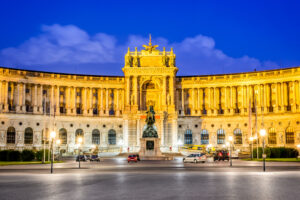The European aristocracy mourns the untimely death of Archduchess Estelle of Austria, who passed away on March 4, 2025, at 46. Her family confirmed this announcement in the Carnet du Figaro bulletin.
“Her husband, Archduke Carl Christian, their children, her parents, and her in-laws are deeply saddened to announce that Archduchess Estelle of Austria, née Lapra de Saint Romain, was called to God on Tuesday, March 4, 2025,” read the solemn announcement. Details of the cause of death have not been revealed. No details regarding the cause of her untimely death have been disclosed.
Born Estelle Lapra de Saint-Romain in Orsay, France, on January 19, 1979, she was the daughter of Pierre Lapra de Saint Romain and Nora Boucharlat de Chazotte. Estelle is survived by her husband, Archduke Carl Christian of Austria, and their five children: Archduchess Zita, 15; Archduchess Anezka, 14; Archduchess Anna, 12; Archduchess Paola, 10; and four-year-old Archduke Pier-Giorgio.
Her funeral service took place on March 11, 2025, during a requiem Mass at the Franciscan Monastery of Cimiez in Nice, France, where the family lives.
Estelle joined the Habsburg-Lorraine dynasty in 2007. They were married first in a civil ceremony on April 18 in Montgirod, a small commune in Savoy, France, followed by a Roman Catholic wedding on June 2 at the Saint Bruno Church in Voiron, near her hometown.
The wedding had 300 guests, including royals such as Princess Astrid of Belgium, Prince Gundakar of Liechtenstein, Princess Marie of Orléans, and Prince Jean Napoleon. The event concluded with a reception in Saint Romain and a honeymoon in Mexico, marking the beginning of their marriage.
Archduke Carl Christian is the eldest son of Archduke Rudolf and Archduchess Marie-Hélène, and a cousin of the current head of the Austrian Imperial House, Archduke Karl von Habsburg. The monarchy was abolished in 1918, but the Habsburg family remains prominent in European nobility.
Estelle fulfilled her role in the Habsburg family with grace and maintained a low public profile while balancing her responsibilities as a mother and participating in charitable causes. According to Spanish publication Todo Alicante, “She participated in numerous charitable initiatives, particularly in the fields of education and the preservation of historical heritage.”
The couple was last seen at the Debutante Ball in Paris in 2019, as reported by E-Noticies: “The couple enjoyed a discreet life but had a presence at significant social events.”
The news of her passing has sent shockwaves through royal circles, with tributes pouring in from royalty and aristocracy, as well as from those who knew her through her philanthropic work. The sudden nature of her death has heightened the sense of loss, leaving many to respectfully speculate while honoring the family’s privacy.
The Habsburg monarchy was abolished in 1918 following Austria-Hungary’s defeat in World War I. Emperor Charles I, the last Habsburg ruler, renounced participation in government but did not formally abdicate.
The newly established Republic of Austria was declared on November 12, 1918, ending over six centuries of Habsburg rule. In 1919, the Habsburg Law was enacted, stripping the imperial family of their titles and confiscating their property.
Since then, Austria has been a parliamentary democracy. The country became the First Austrian Republic (1919–1934), followed by an Austrofascist dictatorship (1934–1938), then annexation by Nazi Germany (1938–1945). After World War II, Austria regained independence and, in 1955, declared permanent neutrality, a key condition of the State Treaty that ended Allied occupation.
Today, the Habsburg family holds no political power, but they retain cultural and historical significance. Public opinion is mixed—many Austrians see them as part of the nation’s heritage, while others view them as outdated aristocrats. Although there is no strong movement for monarchy restoration, members of the Habsburg family remain active in European affairs and charitable causes.

